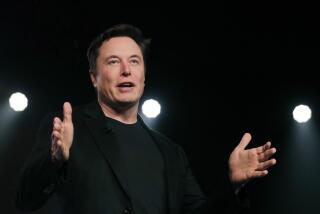Building Up for Bionic Success
- Share via
The folks at Advanced Bionics aren’t modest when it comes to their goals. They want to help the deaf hear, the blind see and the paralyzed regain the use of their arms and legs.
Lofty, perhaps. But with technology advancing at breathtaking speed, employees at the Sylmar company believe their aspirations are within range. They’re gearing up to be next century’s leaders in neurostimulation.
No longer are the Bionic Woman and the Six-Million-Dollar Man science fiction; today such medical device technology is reality, company officials say.
“It’s a very, very exciting time to be working in this area,” said company President Jeffrey H. Greiner.
Advanced Bionics is only one of 2,500 Southern California companies that manufacture medical products, according to the Biomedical Market Newsletter, which tracks industry trends. No other region in the world has as much biomedical activity, said Publisher David G. Anast.
Advanced Bionics is upbeat about its future, though it has yet to prove it can capitalize on an industry that has stunning potential as well as significant financial risks. Armed with millions of dollars from private investors, the company must soon turn a profit and develop new technology to attract the millions of additional dollars needed to fund its research.
Advanced Bionics expects sales to reach $20 million this year, almost double that of last year. The growth is impressive, considering the company’s only marketable product, the Clarion cochlear implant, received approval from the Food and Drug Administration only within the last year.
But Advanced Bionics spent $30 million on research for the Clarion and is still struggling to market the device, which can restore hearing to profoundly and severely deaf individuals.
Its marketing push is being hampered by some deaf activists, who believe a moratorium should be placed on cochlear implants pending further research because some recipients have experienced side effects.
Greiner acknowledges that the implants don’t always restore hearing, but they are safe, he said.
The pressure is on for Advanced Bionics to win public approval, because it is planning to go public next year and needs to boost sales to win investors.
“We’re spending millions of dollars on advertising this year to introduce the Clarion to the millions of deaf people who could benefit from it,” Greiner said. “We believe once people who have need for this technology become knowledgeable about it, the market will grow rapidly.”
The company is also creating technology that would restore vision to the blind, rehabilitate muscles of stroke victims, treat female urinary incontinence and relieve pain through an implantable neuromuscular stimulator.
Greiner said the company is within a few years of clinical trials on the urinary incontinence, pain and muscle rehabilitation devices, which all utilize a device injected by hypodermic needle called a “bion.”
“There are only a few companies in the world specializing in implantable neurostimulators because the technology is still developing and it takes a tremendous investment,” he said. “But there are multibillion-dollar opportunities for companies appropriately positioned to be leaders in this area, and we believe we are in that position.”
Robert C. Faulkner, a medical device analyst at Hambrecht & Quist, also believes Advanced Bionics could realize its goals, because it is already highly regarded in the medical device industry.
“Advanced Bionics is on the cutting edge and pushing technology forward,” he said. “The fact that it’s already developed an exceptional product in neurostimulation, the cochlear implant, is very significant.”
But Faulkner’s confidence in Advanced Bionics is linked primarily to its founder, Alfred Mann, who started five other successful high-technology companies. Mann serves as chairman of Advanced Bionics, although he spends the bulk of his time heading MiniMed Inc., which develops and manufactures advanced insulin pumps and is developing an artificial pancreas.
“Alfred Mann has been able to attract investors and make a lot of money for them,” Faulkner said. “He has a track record of developing and commercializing products, so that speaks for itself.”
*
Smith Barney analyst Melissa Wilmoth said Advanced Bionics should take the lead from MiniMed, which has attracted considerable attention on Wall Street. MiniMed’s stock price has tripled since its initial public offering because it is profitable, has secured patent protection and FDA approval, faces little competition in a largely untapped market and is developing groundbreaking technology, she said.
Faulkner said Advanced Bionics could be equally successful, but it needs to come out with new and profitable products soon.
“In general, investors aren’t willing to wait as long as they used to for companies to come out with new products,” he said.
Greiner said the company plans to introduce some new devices within the next two or three years.
“We need to choose applications that will bring in revenue,” he said. “That won’t be the device for the blind, but it could be the device for female urinary incontinence, which is a multimillion-dollar industry.”
Ironically, Advanced Bionics began as purely a humanitarian effort. But after a rival company told Mann he wouldn’t be able to develop a cochlear implant, he incorporated Advanced Bionics in 1993 and shaped it into a business.
“I had no intention of making money on it,” Mann said. “But a major competitor in the field effectively insulted our project to the point where I was spurred on.”
Now, having created a technically sound device, Mann said the company’s main priority is to market the Clarion to the tens of millions of deaf people worldwide who may benefit from it. The FDA approved the implant for adults in August 1996 and for children last June.
So far the company has sold 1,600 devices in 26 countries. About 1,000 of them were sold this year.
“We intend to significantly increase that number next year,” Greiner said, adding that the implant, not including surgical and hospital fees, costs about $17,000 in the United States. “The market has not yet been penetrated, because deaf people and clinicians are not yet aware of the benefits.”
And the implant has faced considerable resistance from some prominent and vocal segments of the deaf community, who believe cochlear implants can be dangerous and ineffective.
“The National Assn. of the Deaf is opposed to all pediatric cochlear implantation,” said Suzy Rosen, the organization’s legal counsel for government affairs. “There is widespread failure of the industry to fully inform potential implant users as well as parents of significant risks of cochlear implants and maintenance, as well as other risks involved besides medical.”
The association said some recipients have had to remove their implants or have them reimplanted because of complications, such as use-related trauma and fractures. Because implants are constantly being updated, the group believes they should not be used on children until their usefulness is fully proven.
“When the devices reach a level of safety considering all the medical, psychological and bioethical concerns brought forth, the National Assn. of the Deaf will review its position,” Rosen said.
But Greiner said the devices have been proven safe and effective. In clinical trials for the Clarion, most adults with implants could talk on the telephone, and most deaf children using the device could recognize sounds and use speech to communicate, he said.
*
Cochlear implants differ from hearing aids in that they are surgically implanted and do much more than amplify sound. They use computer technology to bypass damaged parts of the inner ear by sending electrical sound signals directly to the auditory nerve.
The device is available to profoundly and severely deaf adults who are unable to understand speech with hearing aids and who have lost their hearing after acquiring some speech and language skills. All severely or profoundly deaf children are possible candidates.
Advanced Bionics’ major competitor is Cochlear PTY of Australia, which now has the largest share of the cochlear implant market.
But Greiner said Advanced Bionics is gaining on Cochlear PTY’s lead because many consider it the most technically advanced implant with FDA approval.
“I think Clarion is a big step ahead of earlier devices because patients are getting better sound quality,” said Jan Larky, coordinator of the cochlear implant program at UC San Francisco, which participated in Clarion’s clinical trials. “Surgeons feel it’s an excellent device.”
More to Read
Inside the business of entertainment
The Wide Shot brings you news, analysis and insights on everything from streaming wars to production — and what it all means for the future.
You may occasionally receive promotional content from the Los Angeles Times.










